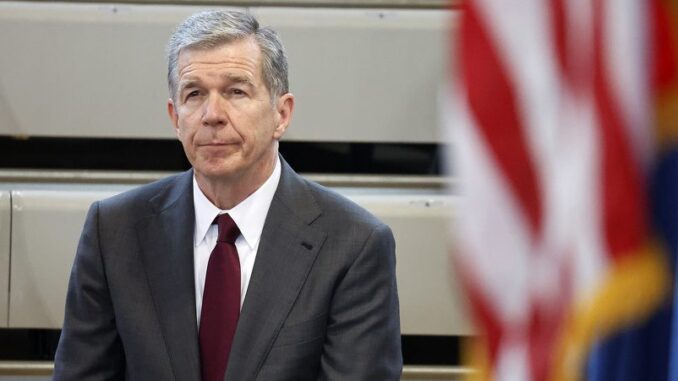
RALEIGH — North Carolina Gov. Roy Cooper promoted his “Year of the Public School” proclamation at an unannounced visit to the N.C. State Board of Education last week.
During his remarks, he emphasized the importance of “fully funding” public schools while criticizing the Republican-led General Assembly, claiming it provides insufficient state funding for public schools. Cooper cited statistics from the National Education Association, one of the two largest national teacher unions, on low starting teacher pay and a below-average investment per student.
Cooper also highlighted the achievements of public schools, such as high graduation rates and the number of nationally board-certified teachers, before going on to condemn the expansion of the Opportunity Scholarship program, stating it could divert “$200 million” in funds from public schools.
“That’s wrong, particularly when most private schools are not better than our public schools,” Cooper said of the scholarship program spending. He went on to make several claims that private schools are “unaccountable.”
“They don’t have to tell taxpayers what they teach, how their students perform, which students they will reject or whether students even show up at all,” said Cooper. “That is a reckless, reckless waste of taxpayer money.”
He then called for a “moratorium” on the state’s Opportunity Scholarship program until public schools are adequately funded.
Cooper’s call for a moratorium follows a record number of 72,000 applications for the program as of February. During the first five days of the application cycle, 31,603 applications were submitted.
The program’s expansion became law last year after the legislature overrode Cooper’s veto of the bill. The scholarships were expanded to all families and awarded with priority toward low-income households on a sliding income scale.
Cooper told board members to talk with the public, educators, administrators and parents and put pressure on the legislature by telling lawmakers four things.
“One, great things are happening in our public schools,” he said. “Two, put a moratorium on private school vouchers until we fully fund our public schools. Three, pay teachers like the professionals they are. And four, expand access to early childhood education, more pre-K more quality child care.”
State Superintendent Catherine Truitt addressed some of Cooper’s comments about funding.
“I would like to make a suggestion to this board, and that is that the (Leandro) Comprehensive Remedial Plan was created well before the pandemic, did not include the Science of Reading, did not address the very specific fix that needed to be made in the way that our preservice teachers were learning to teach children to read, and the way that our current teachers were teaching children to read,” Truitt said.
Truitt went on to say that because of the bipartisan Excellent Public Schools program, “students are seeing double-digit gains in reading proficiency,” including all minority students, and “that was not a part of the comprehensive remedial plan.”
She also noted that more money does not equal better student outcomes.
“Right now, spending and education in the United States has increased even when adjusted for inflation, however, gains are flat,” said Truitt. “New York is now spending $30,000 per student, and they’ve seen no movement in NAEP scores in reading proficiency or math proficiency between 2002 and 2020.”
“Now, I know we need to spend more on education, but we don’t have a road map to do that right now,” Truitt said while going on to describe difficulties in attracting teachers to rural areas, while teacher pay is “stuck in another era,” but also that teacher compensation in the state that has “grown 79%” since 2002.
“A decade ago the benefits package for a teacher was 11%, now it’s 36%,” Truitt said. “It costs $60 million to raise teacher pay 1%. While I don’t disagree that we need to spend more, it’s how we spend the money that matters, and the comprehensive remedial plan is not going to get us there.”
Cooper responded to Truitt’s remarks by saying, “There’s a lot to unpack there, but I think, yes, there’s going to be a lot of debate on how we invest the funds.”
Lt. Gov. Mark Robinson weighed in on the conversation, saying he believes the path to education excellence lies with parental control.
“If we forget about the fact that we need to give parents the right to have absolute control over their children’s educational destiny, we are failing here,” said Robinson. I’ve heard a lot about the public education system. I’m concerned about the students and the parents inside of that system, and I’m not concerned so much about a sound, basic education. What we want is excellence. We don’t want just a sound, basic education, we want a world-class system that delivers in every corner of this state.”


